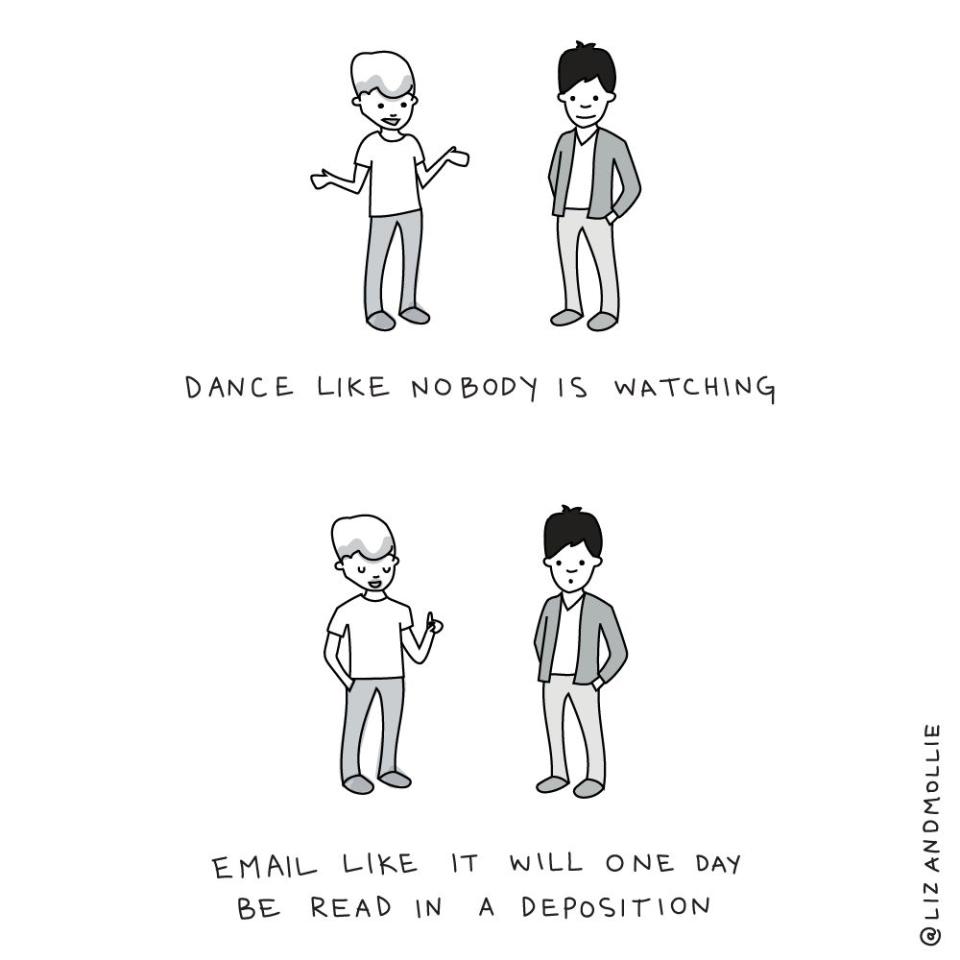How To Deal With An Oversharer At Work

To build collegial relationships with co-workers, you need to share who you are beyond the transactional talk of deadlines and deliverables. But anyone who has endured an uncomfortably revealing conversation with a clueless colleague knows there is a boundary between healthy candor and cringe-inducing oversharing. Three in five workers said they encountered at least one oversharer at work per week in a 2014 SurveyMonkey survey.
The problem is that the boundary between appropriate sharing and inappropriate self-disclosure can vary from person to person.
The HBO series “Silicon Valley” offered a horrifyingly perfect example: In an honest attempt to help his team leader Richard, an employee named Jared offered unsolicited advice on how Kegel exercises could help Richard improve his health. “I’m doing it right now! Clench, unclench, clench, unclench,” Jared cheerfully explains as his boss learns information he can never unlearn.
When is a personal story too much ― and what can you do about it? For wildly inappropriate disclosures, many employees have the option of going to human resources to file a complaint. But for those gray areas, you may need to gently but firmly set up a boundary before you hear information you’ll never be able to forget.
Some personal sharing is necessary at work.
More workplaces are encouraging employees to bring their full, authentic selves to the office. And that can be good. When teams have psychological safety, or the shared belief that they can speak freely and take risks without judgment, they can be more successful.
Without this psychological safety, communication breaks down. Organizational experts have detailed case studies of “inscrutable leaders” who come across as remote and inaccessible and lose the trust of their teams and clients.
Oversharing can come from a good yet misguided place.
Sharing can become oversharing when it makes people uncomfortable and undermines their ability to work with others. But before you ask what on earth your colleague was thinking, recognize that oversharing can arise from a positive desire to build a relationship.
“Oversharing comes from wanting to connect and express themselves and build a relationship with you. When setting a boundary, it’s important to acknowledge that,” said Melody Wilding, a licensed social worker.
A misguided approach to building this relationship may simply reveal another person’s insecurities.
“People with an anxious attachment style are often the ones who overshare because they fear emotional distance in relationships,” said Julie de Azevedo Hanks, a psychotherapist and author of The Assertiveness Guide for Women. “They often cope with their anxious style by being clingy. They generally want to be closer to other people than others want to be to them.”
Knowing where an oversharer is coming from can help you approach the boundary conversation the right way.
How to stop an oversharer and not become one yourself.
1. Share what you would feel comfortable hearing from someone else. To assert boundaries, you must first recognize where yours are.
Mollie West Duffy, co-author of No Hard Feelings: The Secret Power of Embracing Emotions at Work, told HuffPost that before they disclose personal details, managers and employees should consider what they would like and not like to hear about from others.
“[Ask yourself,] ‘If my boss was about to share this with me, how would I feel?’ Most of the time, you’re like, ‘Oh, I feel actually really honored and valued and trusted that this person is sharing this with me,’” Duffy said. “But there are sometimes, you’re like, ‘Oh, that would be too much information. I would feel weird if my boss shared that with me.’ Then that’s a sign you shouldn’t do that with your reports. I think the same is true with friends and colleagues.”
2. Read the room. Each workplace has its own governing assumption of what constitutes oversharing. Try to observe what others at your workplace do.
“Especially when you are new, you have to wait a while to pick up on how much are people sharing about families and their love lives and their outside-of-work things,” Duffy said. “Default to sharing less when you first join an organization. As you get to know the norms, you can share more.”
3. Be straightforward. Take a kind and candid approach to setting a boundary when a colleague says too much, Hanks said.
“It’s OK to say, ‘I’m starting to feel a bit uncomfortable having this conversation at work.’ Or ‘I feel honored that you trust me, and I’m not sure I want to know this much,’” Hanks said.
You can be firm but gentle in this conversation by acknowledging what the other person is sharing. Bring up your concerns “in a way that would be both respectful to [yourself] and the other person,” Wilding said.
Wilding suggested that you first validate the oversharer with comments like, “I appreciate you sharing that with me” or “I’m happy to know that you trust me with that type of information.”
This small moment of connection can ease the harder request to follow. “That’s what can help the person feel seen and heard, but also receptive to the comments that are going to come next,” Wilding said.
Remember that confronting a colleague about their behavior can be uncomfortable, but it does not have to be the end of a relationship. “We equate conflict as being bad. And that’s not always the case. Conflict is needed to grow,” Wilding said.
4. Redirect the conversation. Hanks said you can also try a less direct approach by changing the subject with an oversharer. She recommended something like, “Hmmm. That’s interesting. I’m curious ― what are your plans for next week’s presentation?”
The boundaries can get blurrier with colleagues you have befriended outside work. If those you hang out with on the weekends are getting too personal on the job, it’s time to turn the conversation back to the work relationship. Tell the oversharer, “I appreciate you sharing that with me. In the future, this is something I would like to talk about while we’re out at drinks instead,” Wilding suggested.
5. Don’t forget that employers can read your online chatter. And beware that the internet can lure us into sharing more than we would otherwise face-to-face.
Psychology professor John Suler calls this the “online disinhibition effect.” He said that people may become more uninhibited with their thoughts online because they feel anonymous or invisible and they feel like equals with others in cyberspace. Also, when you don’t have to deal with a colleague’s immediate in-person reaction or judgment, you may blab more than usual.
To stop this impulse, remind yourself and others that online communication at work can be seen by your employers. How would you feel if that opinion you shared in an email or a Slack channel were publicly known? Remembering the consequences of too much disclosure will help you recognize when to assert boundaries with your co-workers.
As No Hard Feelings co-author Liz Fosslien advised in one of her illustrations for their book, “Dance like nobody is watching. Email like it will one day be read in a deposition.”

Related Coverage
Work Is Not Your Family, As The Fyre Festival Doc Reminds Us
The 27 Most Annoying Things Co-workers Do, As Told In Tweets
Why Replying 'OK' In Work Chats Sounds So Aggressive, According To An Internet Linguist
Love HuffPost? Become a founding member of HuffPost Plus today.
This article originally appeared on HuffPost.

